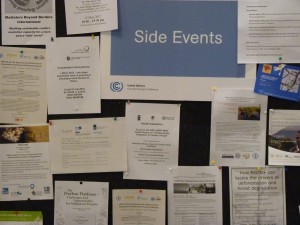Peatlands … on the fringes of the Bonn climate talks
The talks going on in Bonn right now are an “intersessional climate session”, i.e. talks between the talks… aimed at making progress on the issues to be decided at the next round of climate changes talks “proper” which will be held in Doha in Qatar at the end of the year. I would not have the patience these negotiators need, with the talks crawling along at what would seem to your average person to be a snail’s pace, considering the speed with which climate change is actively affecting our planet. It’s not easy to get countries to commit to emissions reductions, rainforest protection, financing for developing countries etc. But while the different working groups meet, filling the conference rooms of a large Bonn hotel and the nearby German Federal Environment Ministry, different organisations take the chance to publicise their work and new practical initiatives to work against global warming, in the corridors and foyers and in numerous “side-events”, which for me as a journalist are one of the most interesting things to follow at these gatherings.
Wetlands International is one of the ngos that is always faithfully in evidence, and this time they joined forces with the FAO (UN Food and Agriculture Organisation) to launch a new global initiative to reduce greenhouse gas emissions from peatlands. Not many people realise that although peatlands cover a relatively small area of the globe they contain nearly 30 percent of all carbon on land. When they are drained for agriculture, grazing, or forestry, they make a big contribution to global greenhouse gas emissions. The new initiative wants to increase awareness of how the conservation, restoration and sustainable use of peatlands can reduce global greenhouse gas emissions and help make measurable progress in doing this. “The key message we want to convey is that it is urgent to keep peatlands wet. When possible, we need to restore drained peatlands and make them wet again”, says Susanna Tol from Wetlands International. Some 15 percent of the world’s peatlands have been drained already. One major problem is draining in tropical areas to make way for oil palm plantations to provide biofuel – bad for the climate and a danger to food security.
Download the publication: Peatlands – guidance for climate change mitigation by conservation, rehabilitation and sustainable use:

















